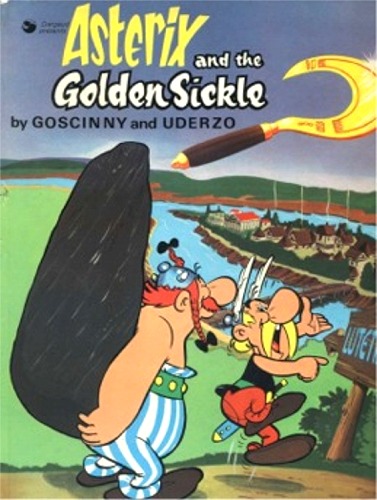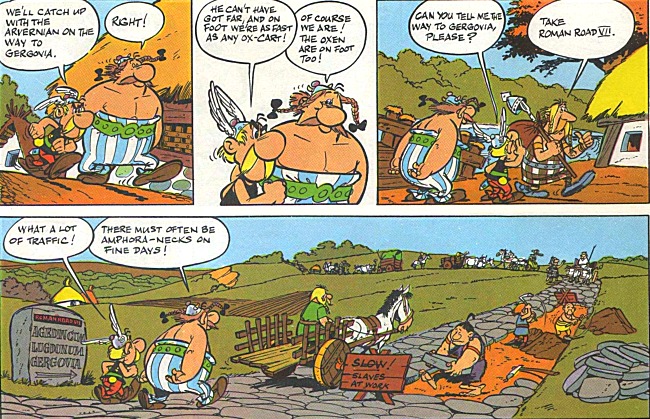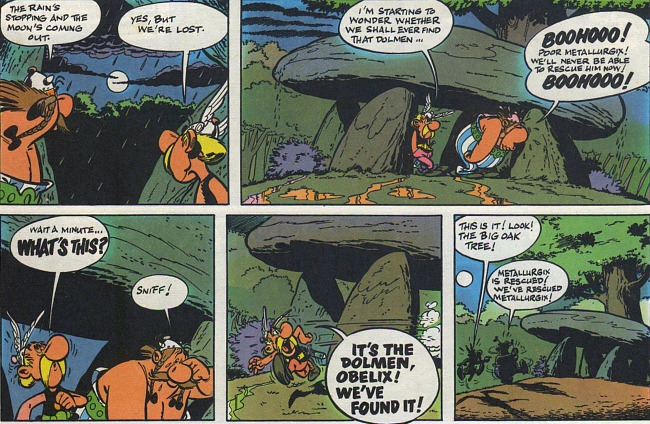Asterix vocabulary
Glossary 2/6: Asterix and the Golden Sickle
Astérix et la serpe d'or, Astérix y la hoz de oro, Astérix e a Foice de Ouro, Asterix e il falcetto d'oro, Asterix und die goldene Sichel, Asterix en het gouden snoeimes, Asterix och guldskäran, Asteriks ve Altın Orak, Asterix dan Sabit Emas.
I can't give you free Asterix books, but for six of them I give you a glossary of all the Latin, and the unusual words, phrases and word games.
The glossary:
- Various gods and goddesses appear in all the Asterix books. Toutatis, Belenos, Belisama, Taranis, Lug, Epona (Gaulish); Jupiter, Mercury, Pluto, Minerva, Apollo, Vesta (Roman); Zeus, Hermes, Hades, Poseidon, Athena, Ares (Greek); Ra, Isis, Osiris, Horus, Anubis (Egyptian).
- Gaul (p3). A province of the Roman empire. Today it's France.
- indomitable (p3). A person who will always resist; unconquerable.
- fortified (p3). Made into a military base with strong walls.
- shrewd (p4). Understands a situation quickly; cunning, clever like a fox.
- a potion (p4). A magical liquid.
- a druid (p4). A Celtic priest.
- a menhir (p4). A megalith, like the big stones at Stonehenge and Carnac.
- a wild boar (p4). A wild pig. Obelix's favourite food.
- mistletoe (p4). A small green plant with white fruit. It grows on trees, and people say it is magical.
- a bard (p4). A poet, musician and teacher.
- majestic (p4). Impressive, like a king.
- sickle (p6). A farmer's knife with a curved blade.
- Lutetia (p6). The city of Paris.
- cauldron (p8). A very big cooking pot.
- contrite (p9). Sorry, apologetic, repentant.
- Suindinium (p10. Le Mans (home of a famous motor race, the Le Mans 24 Hours).
- Ben Hur (p11). A classic film about a chariot race, starring Charlton Heston.
- amphora (p11). A big Greek or Roman pot for wine or oil.
- distinguishing marks (p14). For example, red hair, a scar, a missing finger, or being unusually fat or tall.
- bare-faced robbery (p16). An obvious crime.
- small-timer (p17). The French original says “minable”, and I think a better English translation is “loser”.
- Cave! (p17). Latin - "Watch out!" or "Hide!"
- X to I (p17). A small joke about the English expression “ten to one it’s going to [rain, etc]”.
- all raids lead to Rome (p18). A raid is an attack. This is a small joke from the Latin tag “all roads lead to Rome”
- vade retro (p18). Latin - "Get back!"
- centurion (p19). Roman military officer with 100 men (a lieutenant).
- decurion (p19). Roman military officer with 10 men (a corporal).
- pax Romana (p19). Latin for "Roman peace". The Roman army was like a police force in the countries it conquered.
- punch-up (p20). A fight without weapons, usually in a pub. A brawl.
- amphora-necks (p23). A little joke about the common expression "bottlenecks" (narrow places where cars have to go slowly).
- a rotten sport (p30). 1930s English. Today we say "a bad loser".
- a dolmen (p31). A Stone Age ceremonial structure made of three or four very big stones.
- a trapdoor (p33). A small door, usually horizontal.
- a swig (p34). A gulp, a mouthful.
- Ye Gods! (p34). An exclamation (1930s English).
- a boarlet (p34). An invented word for young wild boar.
- goody goody gumdrops (p34). A children's expression.
- a sestertius (p37). A small Roman coin.
- a gourd (p39). A bottle made by drying a plant like a pumpkin.
- Verginceritox (p39). A drunken attempt to say “Vercingetorix” who was a famous Gaulish military leader against the Romans.
- an amphora (p39). A Greek or Roman bottle or pot. It was tall and had a narrow neck.
- a cohort (p41). A Roman military term. It was an army unit of 800 men.
- thingy (p42). An abbreviation for thingamajig, or thingummy, which are words you use when you can’t remember the correct word, especially when drunk... like what’s-its-name (or whatsit, wotsit or whosit), whatdyoucallit, doofer, widget, etc.
- quis, quid, ubi, quibus, auxilis, cur, quomodo, quando (p43). Latin - "Who, what, where, in what way, with whom, why, how, when". This was Cicero’s system of logical analysis. It is still taught to newspaper journalists to help them decide what the real story is.
- parsing fancy (p43). A very small joke about the common English expression “just a passing fancy”. It's about grammar. To parse a sentence is to analyse it into subject, verb, object, etc.
- acta est fabula (p43). Latin - “acta est fabula, plaudite”. It means “the play is over, applaud”. These are said to have been the last words of Caesar Augustus.
- “I love Lutetia in the Springtime” (p46). Song by Cole Porter - “I love Paris in the Springtime”.



